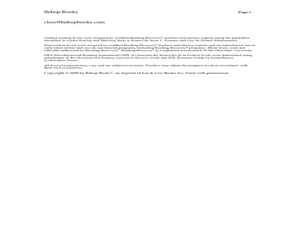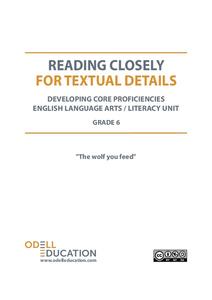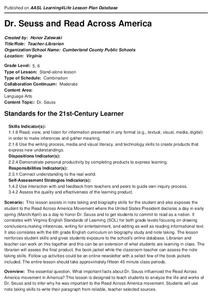EngageNY
Developing Reading Fluency: Criteria for Reading Aloud
Third graders develop their reading superpowers in a lesson plan on fluency. After first listening to an audio recording or teacher read aloud, the class works together identifying criteria for fluent reading, focusing on phrasing, rate,...
Curated OER
What Do You See at the Pond?
With What Do You See at the Pond?, young readers explore pond life and practice reading strategies. Learners first make predictions and then read the simple story independently. After a second read-through with a partner, kids come...
Odell Education
Reading Closely for Textual Details: Grade 6
Close reading doesn't mean to literally read text close to your face, but rather to pay attention to particular details in order to develop a deep and purposeful understanding of text. The first part of a five-part resource provides an...
EngageNY
Developing Reading Fluency: Selecting a Text and Practicing Reading Aloud
Young readers continue to strengthen their fluency skills with a text of their choosing. The teacher first engages the class with an audio recording or read-aloud of a short poem, modeling for children how to read fluently. Next it's...
Ontario
Sample Guided Reading Lesson for Emergent Readers
Give your guided reading lesson plan a boost with a sample lesson plan designed to reinforce academic content covered in previous assessments. The sample plan describes how the story and activities were chosen and offers the following...
Curated OER
Regarding the Fountain: Questioning Strategy—Cubing
Look deeper into the text with a reading strategy based on asking critical thinking questions. While reading Reading the Fountain by Kate Klise, learners think of questions that help them describe, compare, associate, analyze, apply, and...
Curated OER
Cat on the Mat Guided Reading Lesson
Young learners participate in a guided reading lesson. They will read the book Cat on the Mat by Brian Wildsmith. The teacher helps provide the group with reading strategies, and provides more one-on-one support during independent...
Curated OER
ReQuest Strategy: Reciprocal Questioning
Explore reciprocal questioning with this ReQuest comprehension strategy. After reading a passage, learners first question the teacher, trying to "stump" her. Then it is the teacher's turn to ask the pupils questions. All correct answers...
EngageNY
Close Reading: The Introduction to the Universal Declaration of Human Rights
As part of a group of lessons, your class will return to the primary text for this unit, the Universal Declaration of Human Rights. Key vocabulary as well as close reading strategies continue to be the focus skills; however, this lesson...
EngageNY
Close Reading: Unpacking Specific Articles of the UDHR
Lesson 6 of this extensive unit finally has your class begin to work their way through specific articles from the text of the Universal Declaration of Human Rights (UDHR). Before examining the rights actually detailed in the document,...
Hampton-Brown
From "First Crossing"
Young scholars look closely at four tales taken from the collection of short stories, First Crossing edited by Donald R. Galloby. While examining the life of four teenagers and the lives they lead as U.S. immigrants, your enthusiastic...
Curated OER
Dr. Seuss and Read Across America
What important facts about Dr. Seuss influenced the Read Across America movement...? This is the driving question of a research project that requires scholars to find information about Dr. Seuss' life and work. Class members write a...
EngageNY
Continued Close Reading of Nasreen's Secret School: Discussions of Questions and Evidence
Third graders answer text-dependent questions of the story Nasreen's Secret School both independently and then collaboratively through using the carousel of questions strategy. This plan is the seventh instructional activity in a larger...
Novelinks
Where the Red Fern Grows: Graphic Organizer, Story Map
How do you grow a goal from a dream to reality? You make a plan! After reading chapters two and three of Where the Red Fern Grows, learners map how Billy earns his dogs by completing an organizer in pairs and then discussing answers in...
EngageNY
Reading about Freaky Frogs: “The Amazon Horned Frog"
The Amazon Horned Frog is the focus of a activity designed to encourage readers to ask and answer questions. A frog-themed poem opens the door to a whole-group discussion. Following a read-aloud of an informational text, a three-page...
Core Knowledge Foundation
Presidents and American Symbols Tell It Again!™ Read-Aloud Anthology
Scholars look into the country's current president, past presidents, the White House, Washington D.C., and the Declaration of Independence. They identify the flag, the Statue of Liberty, as well as Mount Rushmore and the significance of...
Texas Center for Learning Disabilities
Fifth-Grade Text-Based Intervention
Look no further—here's a resource packed with focused intervention materials for special education teachers. A unique unit plan provides 10 days of structured text-based intervention strategies for fifth-grade learners. Each 30-minute...
Ontario
Reading Graphic Text
Do students really need to be taught how to read cartoons, comic books, and comic strips? Yes. Just as they need to learn how to read other forms of graphic text such as diagrams, photos, timetables, maps, charts, and tables. Young...
Curated OER
Phineas Gage: Questioning Strategy
Focus on chapter two of Phineas Gage: A Gruesome but True Story About Brain Science with a questioning activity. After teaching and modeling several types of questions, learners work with partners and then independently to answer and...
EngageNY
Introducing “If” and Noting Notices and Wonders of the First Stanza
After reading chapter 14 of the story Bud, Not Buddy by Christopher Paul Curtis, scholars take part in a read-aloud of the poem If by Rudyard Kipling and compare it to the reading of Bud, Not Buddy. Learners then go deeper into the poem...
Facing History and Ourselves
First Chapter Fridays
Fridays can be a challenge with learners already dreaming about their weekends. Here's a routine that will bring their minds back to the classroom. Read aloud the beginning of a story, sure to engage your listeners.
ReadWriteThink
Captioning the Civil Rights Movement: Reading the Images, Writing the Words
Scholars boost their knowledge of the Civil Rights Movement with a lesson plan that challenges writers, readers, and historians to analyze primary sources and caption their observations. By way of reading, writing, discussion,...
Novelinks
The House of the Scorpion: Request Strategy
Readers of The House of the Scorpion try to stump their teacher in a QAR questioning game. Pairs craft Right There, Think and Search, On Your Own, and the Author and You questions and the class members then take turns responding to...
Florida Center for Reading Research
Comprehension: Monitoring for Understanding, What Do You Know?
An activity promotes reading comprehension. Readers analyze a text of their choice while activating prior knowledge and asking and answering questions. Scholars enforce multiple strategies to improve comprehension.

























